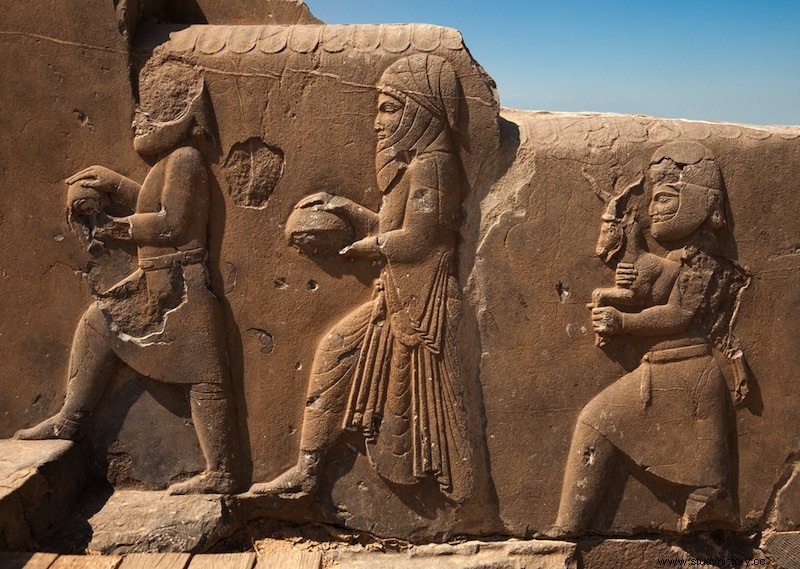"This is Sparta!" yells the Spartan king Leonidas kicking the Persian herald into the baratro in Frank Miller's comic 300 .
That scene was later adapted into the homonymous film with considerable popular success, becoming one of the favorite moments of many fans of recent cinema. And despite the fact that it is not a strictly historical work with many licenses, the scene in question is based on real events , although with some differences.
Frank Miller is a screenwriter and cartoonist who started, like almost everyone else, in the comic-book (Daredevil) and made a name for himself with a story called Ronin (also brought to the big screen), later taking up the superhero genre to give it a new twist. nut to Batman (The Dark Knight Returns) and Elektra (Elektra:assasin ); meanwhile, he was also writing film scripts and triumphed resoundingly with Sin City , made into a film in collaboration with Robert Rodríguez.
But in 1998 he scored another standout hit with 300, a retelling of the Battle of Thermopylae whose film adaptation by Zack Snyder gave it even greater dimension among the public.

300 it is not raised in historicist terms, as the author himself explained. His intention was more symbolic than anything else, which is why his image of the Spartans is sweetened, that of the Persians deformed, and includes that scene outlined at the beginning that actually did not take place in that context but in a similar one but ten years before, in 491 BC, being Darius the sovereign of Persia. And, furthermore, those who gave such harsh treatment to his envoys were not only the Spartans but also the Athenians. At least that's how Herodotus narrates it. in his Book VII, 133:
«There was no Xerxes sent heralds to ask for land from Athens or Sparta for this reason:before, when Darius dispatched messengers for the same purpose, some threw the envoys into the baratro and others into a well, inviting them to bring from there land and water to the king. For this reason Xerxes had not sent them a herald. I cannot say what misfortune befell the Athenians for having treated the heralds in this way, unless their country and his city were devastated, but I do not believe that this happened for that reason ».
Several points must be considered. The first is that Darius I the Great , as you can see, he already had it out with the Greeks before his son Xerxes attempted the invasion described in 300 . It all started in the year 499 B.C. with the Ionian uprising , which despite being of Greek culture were part of the Persian Empire as they were geographically in Asia Minor.
Although they asked for help, only Athens and Eretria responded, so, despite some initial victories, the Persian army ended up putting down the rebellion. Darius then decided to carry out a punitive expedition on Greek soil and it was when he sent the aforementioned heralds. What constituted the First Medical War , however, went wrong with the Marathon disaster; Herodotus tells it in his books V and VI.
A second point is the striking of the act that the Greeks carried out with the Persian envoys in the baratro (the Athenian was a well into which criminals were thrown). It caused a stir, as then the kerykes or heralds enjoyeddiplomatic inviolability because they were considered representatives of Hermes, messenger of the gods.
In The Iliad there is a passage that makes this explicit:the one in which Taltibius and Eurybates, Agamemnon's couriers, tremble at the possible anger of Achilles when they hand over their lord's demand that he hand over the captive Briseis (King's widow Mines , with whom Achilles had fallen in love), but find that the famous hero receives them with honors as "messengers of Zeus and mortals" .
There are other examples that reinforce this consideration towards ambassadors, such as the fact that Themistocles he held that position no less than in Sparta, the great enemy, in spite of which no one ever touched him. Doing something like this could lead to armed confrontation, just as Thebes did with Thessaly after the latter imprisoned her representatives after accusing them of hatching a plot, although, de facto , the sending of heralds already implied a declaration of war (another thing was the figure of the autocrator , a diplomat who acted exclusively in peacetime).
The definitive proof is the very answer that Xerxes gave to the Spartan messengers when they appeared before him ready to die as atonement for the insult of years before and the Great King replied, always according to Herodotus «with greatness of soul, that he would not imitate the Lacedaemonians in that:they , by having killed the heralds, they had overthrown the laws of all nations, but he would not commit what he reprimanded in them nor, by killing the envoys in turn, would he absolve the Lacedaemonians of guilt» (Book VII, 136).

It would still be interesting to review a third point regarding the text of Herodotus and it is the possibility that this author had been confused when writing his work and in reality the heralds ousted by the Athenians and Spartans were, effectively, sent by Xerxes and not by Darius; historian Hermann Bengtson believes so.
Xerxes had inherited the throne in 486 BC and at first he had to face the usual internal problems of the empire in these transitional circumstances, such as territorial rebellions in Egypt and Babylon and attempts to gain power by one of his relatives, in the case of Bardiya, the brother of Cambyses; after all, his own step-siblings were older than him.
Once the situation stabilized, his cousin Mardonius, commander of the army, advised him to resume the conquest of Greece and avenge the humiliation of Marathon. The king accepted -Alexander the Great would do the same in reverse later- and it was then that he sent his ambassadors to demand land and water, the formula with which submission was metaphorized.
It is also possible that Herodotus was not mistaken but was deliberately , since the portrait he leaves of Xerxes is quite pejorative:cowardly, womanizing and weak; an impression based on the great wealth that he possessed, on the difference in customs with respect to the Greeks and on a xenophobic prejudice, rather than on reality.
In fact, other Greek authors describe him as a despot while the Persians had the opposite view:that of a president who was characterized by carrying out great public works. In the end, however, Xerxes would be killed along with his firstborn in 465 BC. during a coup. Before, like Darío, he failed in the attempted invasion of him being stopped at Thermopylae, Salamina and Plataea.
